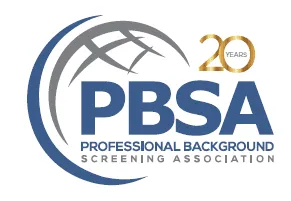
At BCS Background Screening, we specialize in FCRA employment screening, delivering fast, accurate, and compliant background checks for businesses of all sizes. Finding the perfect hire goes beyond skills — it’s about trust, safety, and legal peace of mind.
Our tailored background checks for hiring take the guesswork out of compliance. Whether you’re onboarding a single employee or staffing an entire team, we provide the tools and expertise to make informed decisions with confidence.
View Sample Employment Screening Report + Coverage & Pricing. Most reports are completed in the same day.
It’s all about fairness and accurate reporting
The Fair Credit Reporting Act (FCRA) sets strict rules for how employers can use consumer reports, like criminal records or credit histories during the hiring process. It is expected that candidates will receive a reasonable assurance that the information obtained by the employer will be genuinely accurate, so they can review and dispute any derogatory findings.

What Is FCRA Employment Screening?
The FCRA is a federal law that governs how employers access and use consumer information for employment purposes. This includes everything from criminal background checks to employment history verifications. But compliance isn’t optional, it’s a legal necessity.
Key FCRA requirements include:
- Obtaining written consent from candidates before running a background check.
- Providing clear disclosures about the screening process.
- Following specific steps if you decide not to hire based on the report (known as adverse action procedures).
Navigating these 2025 employment screening laws can feel overwhelming, but that’s where we come in. BCS Background Screening ensures every check meets FCRA standards, protecting your business from costly legal risks while respecting applicant rights.
Ready to Hire Safely? Get Your FCRA Compliant Screening Now!
Pay as you go, only for what you need. Services provided only for legitimate, credentialed business use. NO setup, minimum or monthly recurring fees for credit card customers.
Report Add-Ons
- Nationwide Criminal Database
- County Court Criminal Search (FCRA)
- Statewide Real-Time Criminal Search (FCRA)
- US Federal District Court Criminal Search (FCRA)
- Nationwide Wants & Warrants Search
- Continuous Criminal Monitoring
- Former Employment Verification
- Education Verification
- Driving Records – Real-Time DMV
- SSN Address History Trace
- CBSV Consent Based SSN Verification
- TIN Matching
- Automated Reference Verification Checks
- E-Verify Integration
- Statewide Bankruptcy, Tax Liens & Judgments Combo
- DOT and Non-DOT Drug Screening

New! iScreenHire
A fast and easy way to allow applicants to provide their own employment screening data using mobile devices.
Our FCRA Screening Process
At BCS Background Screening, we’ve streamlined FCRA employment screening into a simple, effective process:
- Candidate Consent: We offer generic forms you can use as a starting point to secure applicant approval and meet disclosure requirements.
- Data Collection: Our team gathers comprehensive data, criminal records, past employment, education, and more tailored to your needs.
- Compliant Reporting: You receive a clear, FCRA compliant report with actionable insights.
- Adverse Action Support: If a report impacts your hiring decision, we can assist you through the legally required steps.
Every stage is designed to keep you compliant while delivering the information you need to hire with confidence. Curious about the details? Contact us to see how our employment background check steps work for your business.
If derogatory records are found
- You must verify that any database records found are updated and accurate at originating source: County criminal court or real-time state government search
- Send FCRA Pre Adverse Action Letter. Wait at least five days to allow the applicant to dispute any discrepancies before taking any further action
- Conduct an Individualized Assessment as per EEOC, based on nature of the offense and how it relates to the job position
- After further review, you may hire or decline employment applicant
- If declined, you must mail applicant a Job Declination Adverse Action letter
613a Letter
Relying only on a nationwide criminal database search to reject a job applicant isn’t the best idea since the records might be outdated. Some employers send a 613a letter instead, which tells the applicant that negative info, like a criminal record popped up and might affect their hiring chances.
It’s a quick way to avoid the hassle and cost of checking county court records right away. If the applicant disagrees with the info, you’ll need to double-check it at the county court. To play it safe, especially with all the FCRA confusion and lawsuits lately, we suggest sticking to the “strict” approach and verifying at the county court from the start.
Did you know? The following States observe seven-year restrictions when processing FCRA criminal searches: CA, CO, KS, ME, MD, MA, MT, NH, NM, NV, NY, TX, WA
The FCRA permits employers to obtain records that are older than the FCRA 7-year limit if you’re applying for a position that pays $75,000 or more. However, you must clearly state this on the applicant’s background check consent form.
Find out whether “Ban the Box” is applicable to your geographical location. “Ban the box” means not asking about past criminal convictions during the initial application process, but rather after the interview and skills assessment if a job offer is to be made contingent upon results of a background check report.
October 1, 2023: California new regulations add restrictions, make clarifications, and significantly change the California background check process.
Effective close of business February 23, 2024, the Superior Court of Los Angeles County will no longer include the month and year of birth as criteria in its criminal name search engines. These revised search criteria apply to courthouse kiosks and the Court’s website at LACourt.org. This will greatly impact our capability of searching criminal records in Los Angeles specifically for common name combinations, even a name match of an unique name cannot be 100% verified.
Integration Partners
Our client portal can seamlessly connect to the following applicant tracking systems (ATS)

